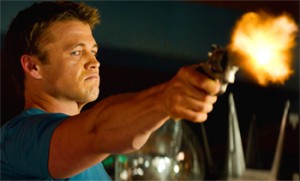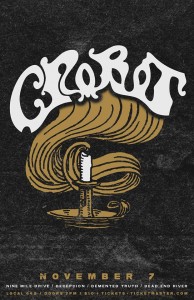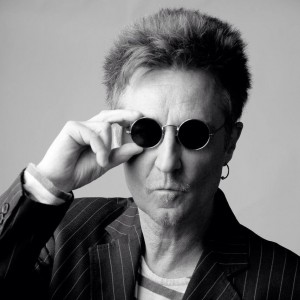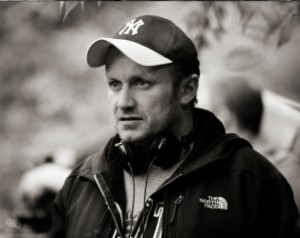Irish director Lenny Abrahamson’s third feature, What Richard Did, made a great stateside impression when it premiered last month at New York’s Tribeca Film Festival check out our review here and is currently on a limited release here at Cinema Village. Now back in Ireland, Abrahamson took some time out of post-production on his next feature, Frank, to speak to me in further detail on What Richard Did.
Lauren Damon: How was your experience at the Tribeca?
Lenny Abrahamson: It was really good! The film, you know seemed to go down well and we got quite a lot of good press and so generally very pleased with it.
LD: Between the festival, onDemand and now this New York engagement, What Richard Did is getting all different sorts of exposure, any thoughts on that?
LA: I mean it’s a very small release but it’s great because I suppose it has a chance to grow if people like it and maybe it gets taken by arthouse cinemas in other towns and also it’ll be reviewed. So that’s all very important…I’ve made three films, this is the first one that’s had a release in the states and I think you know, it’s great. it’s such an important place to have your films seen. And I like Tribeca as a company as well, they look after you pretty well. I think it’s a good name to be associated with.
LD: Were your first two features also Irish dramas?
LA: They were dramas…and they’d been very successful over this side–certainly critically very successful..Both the first two films won British Evening Standard Film Awards and so they’ve actually done well. It’s just that they’re very–the first two films are very, in terms of like accent and demographic, they’re probably tough for an American audience and because of that you find American cinema exhibitors are really frightened of strong accents. Whereas What Richard Did is more of a middle-class milieu and that makes it I think a bit easier. But they’ve been onDemand and they’ve aired on the Independent Film Channel and that sort of stuff and you know, both were in Toronto and the first film was in Telluride. So they’ve existed in the states, they just never got distribution.
What Richard Did tells the story of a middle class teenager (played by Jack Reynor) who, in a drunken brawl, accidentally kills a romantic rival at a summer party. As Richard, Reynor does a spectacular job at playing an otherwise good-natured teen dealing with the crushing guilt of his life-altering action. This includes a tearful confession to his father.
LD: Jack Reynor told me that you made a lot of on-set decisions with the confession scene, how did that change the film?
LA: Yea, well the peak of the scene is when Richard blurts out that he’s responsible for the killing…and that was never in the script. I mean we changed a lot in the script anyway and the script itself was evolving through the writing process. But you know, once you start shooting a film you just test. You just immediately have to respond to how the stuff feels and you have to look at it. You can’t just stick rigidly to some kind of pre-existing plan and I always like to allow things to evolve. But in that scene particularly, it just felt on the day that there was something sort of bursting to get out in the scene. It happened quite organically, we just kept working on it, working on it, working on it. Shooting it, shooting it, shooting it, until we just felt that Richard had to…in the moment where his guard is down because he’s being held by his father and everything that that means, he allows himself to dissolve a little bit…he becomes more of a boy again. And so he just goes that last little bit and lets it all out in that belief that he has in the instant that this will be cathartic. But it’s not cathartic, it’s dreadful. And it just felt, on the day that felt absolutely right. I can be quite skeptical about you know, people talk about scenes that affect the crew and you know, ‘the whole set really felt something had happened’ and I always think those scenes aren’t great, you know. There’s a kind of illusion that if it feels powerful, it must be amazing and sometimes it’s not. But actually that was one case where it really did feel very strong and it translated onto screen.
LD: Then you also have Richard having a physical breakdown on his own, what was it like on set for that?
LA: We did that–there was always a scene in the script and it didn’t specify in the script really what happened, it was just talked about. I always had this image of Richard on his hands and knees having just woken up in a sort of panic. But while we were shooting we just never got a chance, just given the schedule, we never got a chance to attack that scene really properly. So I decided I would go back after we finished principle photography…Halfway through the cut we went back out to the location and we spent the day there. And I think the way we worked on it was just to develop a kind of physical shape to the scene…I’m a great believer of acting from the outside-in…So rather than talking endlessly about what he was feeling, we just got to a kind of really heightened physical state. And then that brought with it a kind of mental component and Jack found it that way. I mean some actors are different, some actors can think themselves into that state but I tend to feel that starting physically is a–it’s like you know if you kind of intensely enter into the shape of the action. Then a lot of times the kind of interior part comes with it…And we shot it about three times on two cameras, it was really exhausting for Jack. You can tell in the scene. It really felt very good and I think it’s a really important scene in the film.
LD: Did you find yourself wanting the audience to sympathize with Richard through all of this?
LA: Yeah, I mean my sort of view is that we’re all capable of doing sort of awful things and very very few of us are the sort with the kind of bravery you’d need to admit to it if you had the chance of getting away with it. So I would like them to empathize with him just like one should empathize with any other human being I would think. You know, anybody who isn’t a monster. And Richard certainly isn’t a monster. But another way of answering that question is to say I don’t think it’s the director’s job in a film like this to tell people how to feel at all. I think that the important thing is to try to render the situation as truthfully and in as much detail and as much kind of natural veracity as you can achieve…And then if you do that, you allow audiences to enter into that world and then to feel about as they do. I mean of course you make decisions when you cast somebody like Jack, you know there’s instantly kind of warm about him. But there’s also in the way that he played Richard, there are darker aspects too…It’s worth saying that audiences have and audiences will react differently to him. Some people say to me “God, you know, he was chilling and you really did that really well.” And then other people say “He was so beautiful and I cared so much about him and you did that really well” So I think all you can do is try to penetrate as kind of truthfully and deeply as you can as a director. And give as rich an encounter with that world as you can and then you let it go and you let the audience kind of position their own decision inside it.
LD: Did you audition many young actors for Richard?
LA: We did audition a lot of actors for Richard but Jack you know, he just has a certain presence. He’s just absolutely right for that part. When I saw him for the first time, I sort of knew that that would be it. And then we started to adjust the film to fit him, to fit Jack as a person so that we could allow Richard and Jack to overlap. But I didn’t, it wasn’t a hard decision to cast him. I mean it was he’s such an unusually poised young actor. He’s from the right background, he understood the story really well. He knew kids like that. He went to one of those schools. And he’s a really fine actor, I can’t imagine the film working if we hadn’t found him.
LD: Now Jack is going to be in the next Transformers film, were you around him at all when he got that part?
LA: He had said to me that you know, he got had an agent…and then that didn’t work out. He’d been out to the states and he said he was going to go back again…give it another shot. And we were in Toronto together when he was talking about that and I was trying to advise him not to! Because I thought, you know, like so many young actors he would go out there and just get swallowed up. And he had no money and he just had a place to stay just about. I was trying to persuade him he should spend more time in London, but he said to me ‘Look, my plan is to go out to Hollywood and get a three-picture deal…’ I just thought he was deluded! Not that he’s not a great actor. That just doesn’t happen. People are going out there everyday–hordes of kids are arriving there every day and it’s just the reality and the dream are very different. But yea, Jack called me and said ‘I’ve just been cast in Transformers, it’s for a three-picture deal’ and I just thought ‘Well there ya go!’ [Laughs] What do I know? And I’m really delighted for him. Aiming for an autumn release is Abrahamson’s next feature, Frank, which sees Michael Fassbender donning a cartoonish facemask to play an eccentric leader of a band alongside Domhnall 2Gleeson and Maggie Gyllenhaal.
LD: Where are you with Frank now?
LA: We’re kind of hopefully about six weeks away from locking picture and after that it’s just lots and lots of sound work and music work and that. Exciting.
LD: Is this based on the character of Frank Sidebottom?
LA: That’s the thing, the history of the project. Jon Ronson one of the writers was in the Frank Sidebottom band back in the eighties and that’s how this idea began. But actually the character in our film isn’t Frank Sidebottom anymore. So we’ve just made him up. He’s an American instead of a guy from Manchester. He’s a real musician…He’s not–the original Frank Sidebottom was a kind of alter ego, a kind of comedy persona of this guy, so they’re very different. But there is a kind of visual similarity in that Frank Sidebottom wore a head not a million miles away from the head that Fassbender wears in this film. But it’s a totally imagined film.
LD: What was the casting process like on this film?
LA: Like any film it’s a bit of an adventure when you start. I certainly didn’t anticipate–I mean I was delighted to have Michael in it, he’s fantastic. He’s such a great actor and he’s such a fascinating actor because…there’s a kind of energy, a kind of intensity that comes over. And it comes over in Frank despite the fact that he’s wearing a mask. And you still know it’s him and there’s still that kind of quality to what he does. And having him, it helped us get the rest of the cast to be so great. I mean Domhnall Gleeson who’s a superb young actor and he’s destined for really big things and then Maggie as well who’s amazing you know, really very courageous in what she’s doing in the film. So yeah, it was quite an adventure…
It was a really happy shoot and I think the cast really enjoyed it. And that’s not always the case. You know there was a great sense of camaraderie and a real community at the center of the film and I think the best thing about it is the actors really gel together like a band…What you’re going to hear in the film is what they played on the day. The music is all recorded live. So they actually do work as a band. And that was very exciting.
LD: So the cast did they’re own musical performances?
LA: They sing, they play instruments…it’s the real thing… Michael sings, he plays guitar. Domhnall plays keyboard, sings and Maggie plays crazy synthesizers and sings. And then you have Carla Azar who’s a superb drummer in a band called Autolux she plays with. She also plays with Jack White. So she’s the drummer. And then this brilliant young French actor called Francois Civil who just happens to be a great bass player as well. It made the casting really hard because we wanted to cast people who were musical and who could really play instead of having them mime to playback. Which you can tell when that’s happening by watching. So to get a bunch of people who are great actors but also musicians was a really tricky but I think we managed.
LD: Did the mask on Michael stay on throughout shooting?
LA: No! No, I think he would of died if he had to leave the head on [laughs]…It’s really funny, I’ve been cutting the film now for a while and after a while you’re just working with cut sequences. So you’re not looking at rushes anymore, you’re not looking at you know every take from the beginning to the end so I’ll go through the whole day of you know with the editor and we’ll just be looking at him with the head on but every so often we have to look back to the rushes and look for you know an alternate take or something and then you see him, he takes the head off after “cut” and you think ‘Oh Christ, yes, Fassbender!’ you know? You’ve sort of forgotten that he’s there because the character really works…You really believe the character, you forget he’s there. But yea, I think it took some getting used to and we designed the head around–you know it’s specifically designed for him, but it was hard. Visibility was really poor–and he’s running and doing all sorts of stuff in the film so it’s quite an achievement.
What Richard Did is currently on a limited NYC engagement at Cinema Village as well as onDemand. Check back with Media Mikes this fall for more on “Frank”.






